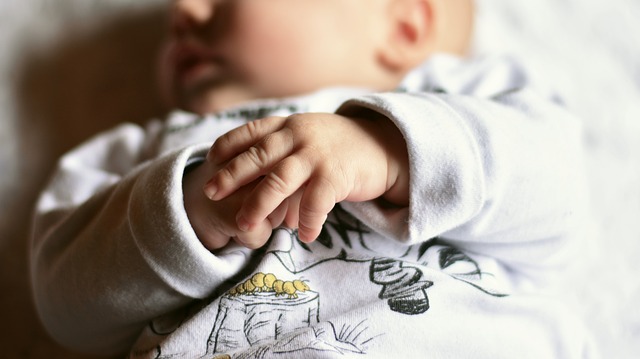We really have to be careful with what terms we use, when we refer to our children. Even if not spoken aloud, the labels that we put on our children in our own minds can influence the way we interact with them and consequently how they grow up thinking of themselves.
Recently, a woman told me that she’s glad that she held her babies when they were younger and coslept with them and breastfed them on demand, even though they were clingy, because it was only for short time that they are that small and want to be that close to Mom around the clock. Another woman in my position might have smiled and nodded, knowingly, or if she disagreed, might have rolled her eyes. Instead, I smiled and told her that her babies weren’t clingy: They were normal!
Biologically normal babies—babies who are developmentally right on track—want to be held all the time, they want to be breastfed on demand, they want to sleep in Mom’s room at night, they want to learn from the world from Mom’s physical and emotional safety. Clingy is a term that is only used for babies when their normal child development isn’t taken into consideration.
A baby can’t be clingy.
Babies who don’t seem to need a lot of attention—those sleeping through the night on their own in another room from a very early age, those who can entertain themselves all day in the playpen, those who are accustomed to scheduled feedings from a bottle—are often referred to as the “good babies.” In actuality, these are the babies we should be concerned about. They are not developing right on track.
That doesn’t mean that every baby that falls under the “good baby” category is not developing to his individual needs, but that babies who are “trained” to ignore their biologically normal needs are not better off by any means. Those biological needs are there for a reason—we may no longer be a hunter-gatherer society preyed on by saber-toothed tigers, but our babies weren’t designed the way they are just for survival reasons.
The brain develops the fastest in early childhood. And how the brain works, physically, is by forming according to the environment that the baby is placed and growing and learning in. Certainly, there are some genetic susceptibilities, but the environment is as big of an influence on how a child develops. Babies are born with the need for physical and emotional closeness to Mom, and if their need for her presence is trained out of the baby, it changes the way the baby’s brain develops. Not that those needs are actually trained out—what happens is the baby learns ways to cope without those needs being fulfilled, and the ways that the baby learns to cope sets the child up for life on how to deal with stress.
Say a baby is left to cry himself to sleep, so he doesn’t want Mom at night, and then put on scheduled feedings, so he only searches for Mom on her timetable and not his, and then left to entertain himself from the swing or playpen or bouncy seat, absorbed in his world of toys and TV, but without learning about the world from Mom’s point of view—this baby is going to grow up learning to be self-sufficient and independent from a much younger age than is biologically normal. Is this good?
Not if you think that eventually that child will be placed in a social environment—school, peers who want to be friends, his own family growing up who want him to interact, his eventual workplace, and his eventual spouse and own children. This child who was taught in his most influential years to deny his biological needs and to then be independent, will not adjust so easily to then being in an environment where socialization, teamwork, partnership, and intimacy will be expected. His brain didn’t develop for those kinds of environments. His brain was developed through “infant training” to survive in a socially isolated world.
There shouldn’t be any wonder why the divorce rate is so high, why there seems to be more bullying, why substance abuse continues to be a problem, why anxiety and depression is such a prevalent coping mechanism, why there are any societal ills. So much of what we see as problems in our society have their original roots in how we raised our children, in how we ignored our child’s biologically normal needs—the true normal of child development—as soon as they were born.
What to do when your baby is clingy? First, stop thinking about your baby as clingy. Your baby is normal! Second, give your normal baby what she needs: You. Hold her, love her, breastfeed her, cosleep with her. Do whatever your normal baby is asking of you, because the environment you’re raising her in, is the one that she will forever operate in. So, if you lead her brain development to operate in a loving, trusting, empathic, joyful, relationship-oriented environment from the get-go, she’ll be much more prepared for a social, relationship-based society than many of the “good babies” whose social needs were trained out of them.
There are no clingy babies.
- When Your Baby Is Clingy - March 2, 2013
- Crying as Sport? - July 10, 2012
- Attachment Parenting Isn’t Asking Too Much of Parents – Our Society Is - May 26, 2012



love, love, love this–thank you!
I do all those things breastfeeding, holding alot but I dont think by any means that parents who dont do “natural parenting” are more likely to raise violent adults. I was a naturally easy baby and I was walking and talking early. babies are people too and some high strong some not and there is nothing wrong with either its just how it is. I have a clingy baby and have no problem admiting it nor will I stop giving her what she needs but its TIRING I see women with naturally easy going babies who have similar parenting styles to mine and go wow lucky u getting to shower during the day! lol
I absolutely understand where you’re coming from, and agree. Just wanted to add that little ones who aren’t developing “normally” need all of this, too. All babies need all of this. 🙂
My baby IS clingy, she’s my “koala bear” baby. She’s worn, held, slept with, fed constantly, responded to 24/7, she’s getting less so but there were weeks where I didn’t put her down except to pee or I’d be met with screaming. She’s 1 year old next week.
She’s also totally normal. She can be both clingy, a word I feel totally entitled to use to describe my daughter in my head and to others, and normal. Understanding it’s normal behaviour doesn’t make it any less true for me.
Maybe also what makes me define my baby as clingy, where I wouldn’t have said that of my eldest, even though he was also worn, coslept, demand fed etc, it’s more that She only ckclings ME. For the first 6 months of life she barely tolerated another person looking at her let alone letting daddy settle her at night or get up with her in the morning. Now a 12kg 12 month old still gets carried most of the day and held at night. She’s no less of a good baby, but she is hard work.
If you say with absolute confidence there are no clingy babies I say you have not met my daughter.
I don’t believe it’s bad to have a child on a schedule or sleep in their own bed at all and here’s why… A. My parents raised me from the time they brought me home to sleep in my own bed and never in theirs. This I find wisdom in as the bed is a place for Mommy and Daddy to still have time to first and foremost be husband and wife. It’s their sanctuary! Baby in bedroom for the first week or so in a moses basket or something like that is a different story. B. When I ate on a set schedule it proved to be better for my health and body. Always has. Plus it gave mom a better idea on how to plan her day. That goes for set napping times as well. C. A child who can play on their own starting young IS a good baby/kiddo. They’re developing their minds and imaginations, what’s the harm in that?I was such a child and can see how beneficial it has been to me. Children thrive on structor! To have things this way doesn’t mean damage is being caused, my sister, husband and myself are all proof of this. As are many other adults in this world.
The word that sounds like “Structor” is actually spelled ‘structure.’ Yes, structure is good. Having a baby that is strongly attached to their parents does not mean a lack of structure. I cosleep with my baby and she has plenty of structure in her day. A child that can play on their own is indeed a good child but when a child that is young can play on their own without demanding their mother or fathers IS concerning and would probably require more structure and attention from parents.
Couldn’t agree more, Rita. Thanks for writing!
For more on the importance of holding our babies — http://locallocale.wordpress.com/2012/02/16/back-to-the-basics-pt-ii-hold-that-baby-parenting-advice-cro-magnon-parenting/ .
do you actually know anything about infant development and brain development? i’m just wondering what you can cite for your claims about why babies are “designed the way that they are”. i’m a developmental psychologist and i don’t know of any evidence to suggest that not holding babies and thinking of them as clingy has any causal connection to bullying and divorce rates — this all sounds like intuition to me. I don’t think there’s anything necessarily wrong with following your own or someone else’s intuition, but I do think it’s a problem if it’s making people feel bad about the way they parent when there is no justified reason for them to feel bad or like what they are doing is wrong.
AM, are you denying the link between forming strong attachment as infants and brain development? I am a trained foster parent, and even we were taught of this research. Those who do not form strong attachments early in life, have difficulty maintaining attachments later in life. Their brains actually change. This has been proven. There is tons of research. Here is just one:
http://www.naturalchild.org/research/cuddles.html
AM, I’m sorry if my first post came across as snarky (I didn’t mean it to.) I do appreciate your point of view. I didn’t personally see that portrayed in this article. I think the goal was to encourage mothers who have been told or led to believe that their baby is “too clingy”, when in fact they have a healthy baby who is developing normally. And that “training” a baby to not be clingy goes against the biologically normal needs of a baby. Babies naturally want to be with their mother (or primary caregiver).
I have had 4 babies, and I would have been worried if they did NOT have anxiety about me leaving them alone. They were all very “clingy” in their own way, and the best thing that anyone did for me was explain to me that it was normal and healthy for them to want to be with me all of the time, rather than feel like I need to “train” my baby to be by themselves. And I am happy to have 4 very well-adjusted children because I accepted that it was normal and I did what I needed to do to keep them happy by meeting their need for closeness.